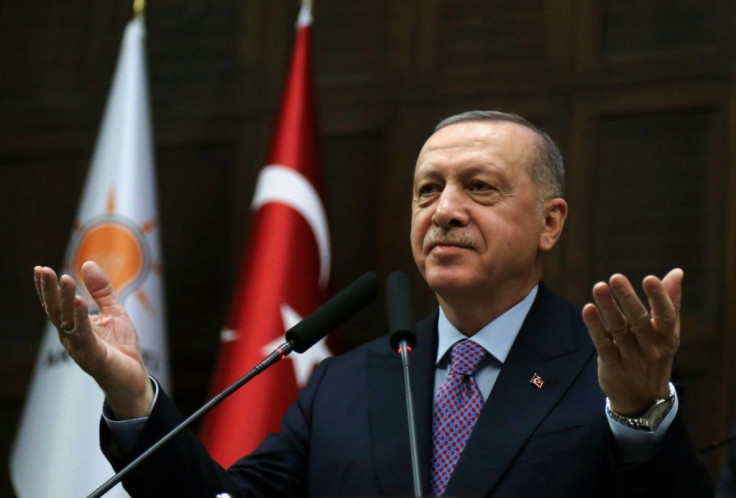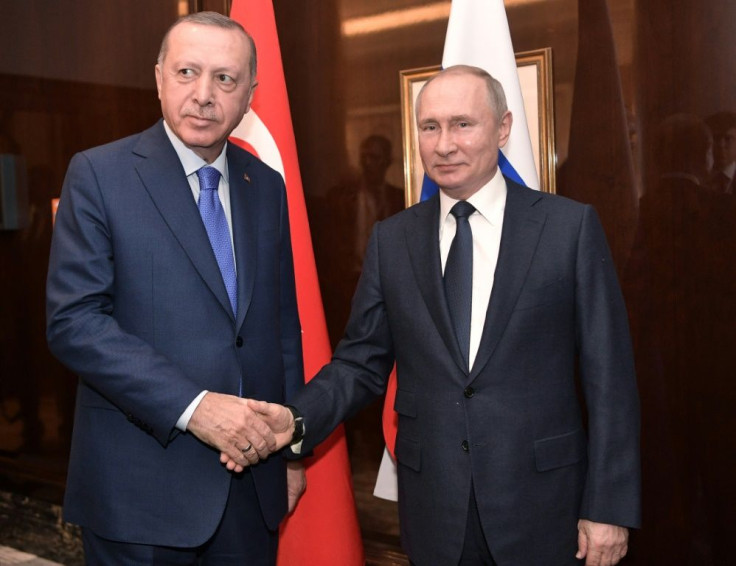Erdogan Rules Out Even 'Smallest Step Back' In Syria's Idlib

President Recep Tayyip Erdogan on Wednesday vowed Turkey would not take even the "smallest step back" in an escalating stand-off with Damascus and Russia over the northern Syrian region of Idlib.
Meanwhile, a meeting between Erdogan and his Russian counterpart, Vladimir Putin, could be in the pipeline, the Turkish foreign minister said, ahead of a possible summit including EU heavyweights Germany and France to find a political solution to the Idlib crisis.
"We will not take the smallest step back in Idlib," Erdogan told his ruling party's lawmakers in parliament in Ankara.
"We will certainly push the regime outside the borders we designated and ensure the return of the people to their homes."
The epicentre of the nearly nine-year long conflict in Syria, Idlib has in recent weeks become the theatre of conflict between Turkey, which supports rebel groups in the area, and the regime of Syrian President Bashar al-Assad, which is backed by Russia.
Ankara has confirmed as many as 17 Turkish security personnel have been killed this month alone.
Erdogan bluntly warned the Syrian regime to "stop its attacks as soon as possible" and to pull back by the end of February.
As part of its deal with Russia, Turkey has 12 observation posts in Idlib but several have come under fire as Assad's forces move to recapture the last big region beyond his control.
"The time we have given to those who besieged our observation towers is running out," Erdogan said.
"We are planning to save our observation posts from the besiegers one way or another by the end of this month."

Erdogan added that "the biggest problem we currently have is that we cannot use the air space" over Idlib which is controlled by Russia.
"God willing, we will find a solution soon."
Shortly after he was speaking, Russian diplomats and military officials arrived in Ankara for talks with their Turkish counterparts. The talks were due to continue from 1100 GMT on Thursday, a Turkish diplomatic source said.

Similar contacts this month in Ankara and in Moscow ended with no concrete results.
In recent weeks Damascus, backed by Russian air strikes, has pressed a major offensive against the remaining territory held by jihadists and Turkish-backed rebels in Idlib.
In a statement read on public television, the Syrian army on Wednesday announced it had "regained control" of a dozen areas in recent days, including Kafranbel in the south of Idlib, a town known to have been among the first to rebel against Damascus.
The army vowed to "liberate the territories of the Syrian Arab Republic from terrorism and its supporters".
The fighting in Idlib has forced nearly one million civilians to flee -- the biggest wave of displacement of the nine-year conflict.
The United Nations has warned against an imminent "bloodbath" amid the continuing violence.
While Western capitals have been criticised for failing to exert any influence on the Idlib situation, the foreign ministers of 14 European nations -- including Germany, France, Spain and Ireland -- issued a joint statement on Wednesday calling for a ceasefire.
A day earlier, Russian Foreign Minister Sergei Lavrov rejected the idea of a ceasefire in Idlib, saying it would be tantamount to "capitulating before terrorists."
French President Emmanuel Macron and German Chancellor Angela Merkel have called for a summit with Erdogan and Putin to seek an end to the crisis in Idlib.
Erdogan on Saturday announced a four-way summit on March 5 but later said there was "no full agreement" on the meeting.
Turkish Foreign Minister Mevlut Cavusoglu was quoted as saying on state-run TRT television, that as a first step "President Erdogan and Putin have agreed to come together at a bilateral meeting."
While backing opposite sides, Russia and Turkey have worked to end the conflict but tensions have soared in recent weeks over Idlib.
The strains are seen as the biggest threat to Ankara-Moscow ties since Turkey shot down a Russian warplane over Syria in November 2015.
© Copyright AFP 2024. All rights reserved.




















